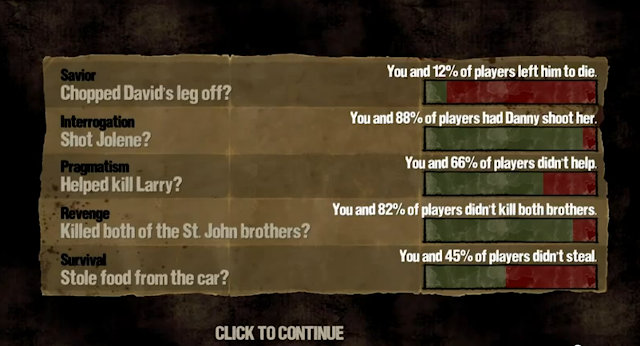Videogames are stupid
aren't they?


I love games, I really do. But it’s hard not to get a little
self-conscious as my better half sits and quietly watches me stab a bad guy,
brutally garrote another and deliver a shotgun coup de grâce to a
third party’s face. Context is everything, I remind myself. There’s a perfectly
valid narrative reason for all this wanton slaughter, and I will inform her of
this once I’ve finished eviscerating this guy with a chainsaw. My character, ever
the wordsmith, yells ‘SUCK IT, BITCH!’ as he steps through a puddle of shiny HD
giblets. My fiancé’s eyes glaze over. I
stay quiet.
Thing is, video games are the fastest growing form of mass
media, teeming with all sorts of exciting and emergent ideas. The passivity of
reading a book, or watching a film, stands in stark contrast to the wonderful
interactivity games can offer. The unique stories that could be told- the sheer
potential. And yet the only games
that find traction sales-wise are variations on pixelated men running around a pitch
and/or pixelated men running around shooting each other.
So I don’t entirely blame my other half for her indifference.
At £40 games are expensive enough to be self-indulgent. The AAA titles that get
all the budget and press are, let’s face it, a sausage fest. Some of the better
written videogames are still about as emotionally resonant as an episode of Hollyoaks,
trotting out tired character tropes, and big titted exposition-machines passing
off as women. Their idiosyncrasies and esoteric logic can only really be understood
with experience. Give a newbie a game pad, with its 14 buttons (and that’s before you try explaining that pressing down
on either of the two analogue sticks counts as a button too), they will freak out. Who can be really be arsed
with all that?
That’s why it’s nice to play a game that defies all of this,
and is my personal 2012 Game of The Year:
The Walking Dead by developer Telltale is not perfect, nor does it innovate per se- it’s a traditional point-and-click adventure game (with terrific production values) of the like that’s been around for decades. What IS innovative is that I can say with a completely straight face that it is a game about human relationships. Relationships explored with nuance and insight, character-driven plotting, pithy dialogue delivered by exceptionally strong actors. Serial drama that's genuinely dramatic. But you know, with zombies.
You play as Lee
Everett, a man who may or may not have done a bad murder. About the time
Lee is getting transported to prison, the zombie apocalypse starts and gives
him a "get out of jail free" card. Shortly after you encounter Clementine; eight years old, scared,
resourceful- awesome. Together you
try and escape the city, meeting fellow survivors along the way. Yes, there are
action sequences, even some lightweight puzzles- but you'll spend the majority
of your time walking, talking- making decisions and living with the consequences.
Your choices affect gameplay; create diverging story paths- in what Telltale calls
a ‘tailored narrative’.
In The Walking Dead,
someone will ask you a question and you'll have a limited time to pick one of
four responses. Whatever you decide, there’s no going back. Characters remember
what you say and take note of your pronoun usage, demeanour, and so on. Over
the course of five episodes, you’ll have to ration a small amount of food for a
large group of starving people, make alliances, choose who will live, who will
die. You’ll teach Clementine how to protect herself, work your way through
abandoned cities and sewers, evade zombies and deal with renegade survivors (sadly, I never encountered a 'curtsy' option to get out of a fight).
The game is worth your attention and purchasing pennies for
a number of reasons-
1) Stellar writing and characterisation – and
not just in the usual ‘it’s good for a videogame’
way. The game dispenses with the TV show’s apathy towards fully fleshed out
black characters, there’s no Lori, no Carl and at no point do you spend half
the season searching for a lost little bint called Sophia- so in that respect
the game’s already head and shoulders above the show. And you know how
sometimes you want reach inside the TV and bang together the heads of some characters;
stop them from saying and doing stupid things? In the game YOU CAN DO THAT. Of
course, in Robert Kirkman’s world, the zombie apocalypse is about so much more
than fighting zombies. You’ll form a close-knit, but deeply fractious bond with
your fellow survivors- and make no mistake; every member of the cast will be
memorable in their own way, driving the plot towards its inevitably bleak and
harrowing conclusion (Yes, even Ben).
2) Episodic gaming is cheap- Games are, as
I mentioned earlier, are very pricey. At £40 you, the consumer, want something
dependable, safe; something that shows off that HDTV you shelled out for. That’s
why bloated franchises and sequels are so rife in games- AAA titles like Call of Duty, Assassin’s Creed, Mass Effect- squeeze out the middle-tier games, make
new intellectual properties hard to stand out- precisely because £40 is such a
gamble. With an episodic series like The
Walking Dead, developers can release one episode, and test the waters. They
can afford to be experimental, to innovate. With The Walking Dead, a full season pass costs £15. Fifteen pounds
sterling. That’s nothing. An episode
by itself is a few quid. Each episode was released about six weeks apart,
generating great word of mouth. After the finale a few weeks ago, and many
plaudits, awards and shiny baubles later, The
Walking Dead is now out in Ye Olde Shops. Episodic gaming can work.
3) Easy to pick up and play (hard to put
down)- In The Walking Dead, you
move around with the sticks and use a single button for pretty much everything.
That’s it. Camera angles are static so there’s no 3D space to throw new players
off. The user interface is clean, simple- hints can be turned on or off. You
rarely die, checkpoints are kind, and puzzles are logical and straightforward.
Anyone who could handle Wii Sports can sure as hell handle The Walking Dead. And that’s fantastic.
4) Clementine- the ace up The Walking Dead’s sleeve is undoubtedly
the character of Clementine. If Clementine didn't work as a character, the game
itself wouldn't work. She is the best videogame character in years. But even
more impressively, she is a masterclass in how to do child characters in any medium.
Children are an easy way to raise the stakes. But it’s
because of this ease of use that kids in entertainment rarely work out well.
Lazy writers use them for instant dilemma fodder and thinks having a kid on its
own is enough to provide a compelling reason to protect, or care about them. They
listlessly concoct stereotypical and wholly unlikable characters in the
process- whiny, helpless, always getting into trouble. Intelligent viewers can
tell when kids are being used for a cynical grab at the heartstrings, and so we’re
very quick to call bullshit on it. When used wrong, they’re just annoying, an anchor that keeps dragging
the main protagonist down. Even The
Walking Dead’s very own Carl in season two of the TV show, who can’t stop
being either a mouthy little shit, or eager zombie bait and has to be rescued all of the time even though we don’t
care about him because he has no
personality.
But Clementine is something different. First of all, she’s
not a useless burden; she saves your character Lee’s life multiple times. While
she’s a child, as vulnerable and in need of rescuing as any other, she’s not a
walking target. She has a very distinct personality;
she cares for people and tries her best to remain upbeat and friendly. Rather
than existing merely as the obligatory child, she exists first and foremost as
an actual person. She doesn’t shriek, squawk, or rattle off snarky
platitudes. Clementine is soft spoken, shy, modest- but also strong and mature
for her age.
And players LOVE her.
I found myself protecting Clementine, making decisions with
her feelings in mind. Not because the game was telling me I had to, but because the game made me want to. I’m actually compelled by
Clementine, not tied to her. Watch the YouTube reaction videos of when
Clementine is kidnapped in the penultimate episode- the panic, the anger! Read
the countless blog write ups like this one eulogising Clementine- she’s a proper
phenomenon. Telltale keeps very thorough
stats on the game- how many people chose to do this, or that, lied or told the
truth etc etc. The stats are fascinating.
The very same gamers who stabbed, garroted and eviscerated their way through countless
other games, en masse chose to do the right thing, the moral thing the majority of
the time. With Clementine acting as their moral compass, we gamers were honest,
caring and would bend over backwards to protect a little girl.
Sometimes, video games aren't always stupid.





No comments:
Post a Comment